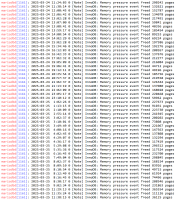Details
-
Bug
-
Status: Closed (View Workflow)
-
Major
-
Resolution: Fixed
-
10.11.7, 10.11.9, 11.4.3
-
None
Description
Thanks knielsen:
I happened upon this patch of yours:
MDEV-24670 memory pressure - eventfd rather than pipe
@@ -896,7 +894,7 @@ void mem_pressure::pressure_routine(mem_pressure *m)
|
}
|
|
|
ulonglong last= microsecond_interval_timer() - max_interval_us;
|
- while (1)
|
+ while (!m->m_abort)
|
{
|
if (poll(&m->m_fds[0], m->m_num_fds, -1) < 0)
|
{
|
@@ -909,6 +907,9 @@ void mem_pressure::pressure_routine(mem_pressure *m)
|
break;
|
}
|
}
|
+ if (!m->m_abort)
|
+ break;
|
+ |
Is it just me, or isn't that if (!m->m_abort) condition inverted? This seems to mean that the thread will never do anything, it will exit immediately the first time it gets any activity on the fd out of poll()?
Attachments
Issue Links
- is caused by
-
MDEV-24670 avoid OOM by linux kernel co-operative memory management
-
- Closed
-
- relates to
-
MDEV-34863 RAM Usage Changed Significantly Between 10.11 Releases
-
- Closed
-


